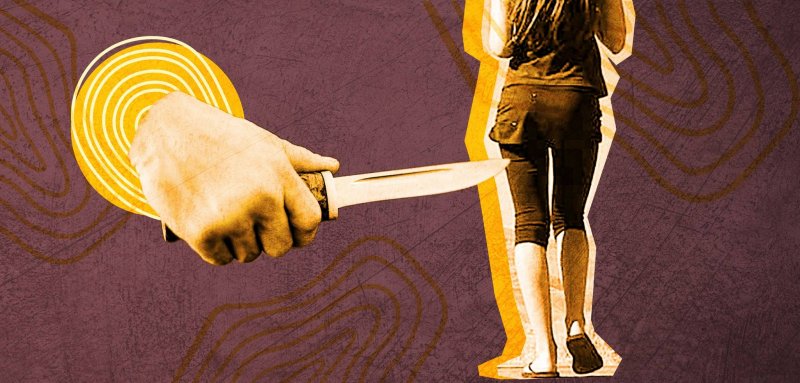In 2003 Tunisia was shocked by news about a mysterious man on a motorbike who held a razor and stalked the streets of the capital looking for women to cut.
The Tunisian National Radio reported at the time that the aggressor (aka the Challat) attacked 11 women using a sharp object (to lacerate their buttocks) as violent “punishment” for wearing tight pants or any type of clothes he deems too provocative.
The story turned into a nationwide sensation as the authorities sought relentlessly to catch the serial attacker who terrified women in Tunis. Although Challat was allegedly arrested and the threat was eliminated from the streets years ago, his attacks became an urban legend that inhibits the memories of women who lived through the peak of fear and paranoia in the aftermath of the incidents and still haunts the collective consciousness of Tunisians.
What women can and cannot wear
The Tunisian slang word “challat” attributed to the anonymous attacker means the man who cut the flesh of female victims causing them superficial wounds. However, the traumatic experience undergone by the victims can by no means be described as superficial as its deep effects have scratched the surface of underlying contradictions between the official narrative of a modern women-friendly Tunisia and the other Tunisia where hatred and violence can materialise into a terrifying reality.
The traumatic experienced by Challat's victims cannot be described as superficial as its deep effects have scratched the surface of underlying contradictions between the official narrative of a modern Tunisia vs the reality of women in the Arab country.
The subtle disparities beneath the story of the Challat and his psychological motives can be directly linked to a social and political milieu that enabled this aggressive pattern of behaviour to flourish and develop into a tangible reality that affected the lives of 11 unlucky women who had to stare directly at the aggressor’s darkness.
The blatant discrepancy between what society aspires for regarding the way women should carry themselves publicly (the way they manifest their sexuality at a deeper level) and how many Tunisian women set their minds to divert from this pattern has evoked in the case of the Challat of Tunis a wave of violence that shook Tunisia.
The Challat’s unleashed frenzy can be traced back to a multiplicity of cultural denominators that stem intrinsically from within the social structure he belongs to, i.e. the triggers that might motivate the attacker’s crimes are inherent in a general perception adopted by a conservative society that draws a line between women who adhere to a specific dress code covering large parts of their bodies and heads especially in densely populated neighbourhoods and popular areas, and those who choose to break with this code.
The Challat's subversive act of cruelty can be analysed in the context of rapidly shifting cultural values in conservative societies which are often faced with resistance and violence in many instances.
Challat and religious extremism
Kawthar Ben Hania, director of the award-winning documentary Challat of Tunis, once said: “We live in a conservative society that quickly experienced the shock of modernization, social change, and globalisation. All of this caused a trauma that resulted in phenomena similar to the Challat phenomenon. In my opinion, the Challat manifested as a disease … like when the body fails to adapt to a new temperature.”
Ben Hania meant that the violence manifested by the presence of the challat in “a pacifist” society like the Tunisian one emanated directly from a failure to adjust to concepts like modernization and globalisation due to underlying incompatibilities between the changes demanded by the West in former colonies (namely the democratisation of state and women liberation) and the entangled webs of ethical and religious dogmas flourishing in countries that have been ravaged by colonisation over decades.
The cultural shock that Ben Hania referred to caused Tunisia to produce the Challat who not only mutilated women’s bodies but also reinforced the visibility of extremism even though the regime of former President Zine El Abidine Ben Ali implemented a zero-tolerance policy to handle extremist acts and groups that often involved repressive measures against citizens and human rights in general.
Ben Ali’s iron first excluded Islamist groups from political life, minimising their presence on the social scene, this may have had a role in creating a halo of admiration around violence committed in the name of Islam, especially in popular circles.
On the other hand, the iron fist of Ben Ali’s system which worked on excluding Islamist groups from political life and minimised their presence in the social scene to extreme levels may had an active role in creating a halo of admiration around these groups in popular circles. Lower middle class/ poor communities who have limited access to adequate education and struggle with marginalisation tend to interiorize a disparaging attitude towards women who show indifference towards the unspoken codes of demeanour, such as in the case of the Challat victims who wore short skirts or tight pants.
As such, the tendency to disown the Challat (who dreamt of a society free of curved buttocks in tight pants) as an alien/extreme occurrence cannot stand knowing that he is the product of a local culture ruled by political, economic, and sexual repression, and cuddled by religious dogma.
Raseef22 is a not for profit entity. Our focus is on quality journalism. Every contribution to the NasRaseef membership goes directly towards journalism production. We stand independent, not accepting corporate sponsorships, sponsored content or political funding.



